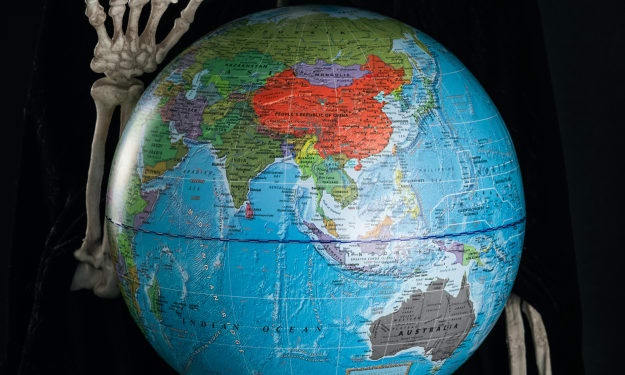"Dear God"
A Reflection on the Relationship between Humanity and the Divine

For millennia, humans have sought to understand and connect with the divine. Whether through prayer, meditation, ritual, or other means, people of all cultures and religions have turned to the divine for guidance, comfort, and meaning. In this article, we will explore the concept of "Dear God" and what it means to different people.
The idea of addressing God in a letter or prayer as "Dear God" is a common one in many religions, including Christianity, Judaism, Islam, and others. It is a way of acknowledging and respecting the divine presence and seeking a personal connection with the divine.
For many, the act of addressing God as "Dear God" is a way of expressing their deepest desires, fears, and hopes. It is a way of seeking comfort and guidance from a higher power, and a way of acknowledging that there is something greater than ourselves in the world.
In some religious traditions, the act of addressing God as "Dear God" is seen as a way of establishing a personal relationship with the divine. It is a way of expressing love, gratitude, and reverence towards God, and a way of seeking forgiveness for one's sins and shortcomings.
For others, the act of addressing God as "Dear God" is more of a rhetorical device than a literal one. It is a way of expressing one's thoughts and feelings in a poetic or symbolic way, rather than a literal one.
Regardless of the specific religious tradition or personal belief, the concept of "Dear God" reflects a deep human desire to connect with something greater than ourselves. It is a way of acknowledging the mystery and wonder of the world around us, and a way of seeking meaning and purpose in our lives.
One of the key aspects of the concept of "Dear God" is the idea of trust. When we address God in this way, we are expressing a sense of trust and faith in the divine. We are acknowledging that we believe in something greater than ourselves and that we trust that the divine has our best interests at heart.
This sense of trust is an important component of many religious traditions. It is a way of surrendering ourselves to the will of the divine and trusting that everything will work out in the end. It is a way of finding comfort in the midst of uncertainty and chaos and a way of holding onto hope in the face of adversity.
At the same time, the concept of "Dear God" also reflects a sense of vulnerability. When we address God in this way, we are opening ourselves up to the divine in a very personal and intimate way. We are acknowledging our own limitations and shortcomings, and seeking help and guidance from a higher power.
This sense of vulnerability can be both scary and liberating. On the one hand, it can be frightening to acknowledge our own weaknesses and failures. On the other hand, it can be liberating to let go of our own sense of control and trust in something greater than ourselves.
Ultimately, the concept of "Dear God" is a reminder of our deep human longing for connection and meaning. It is a way of acknowledging that there is something greater than ourselves in the world and that we are all part of a larger cosmic plan.
Whether we address God in this way through prayer, meditation, or other means, the act of saying "Dear God" reflects a profound sense of trust, vulnerability, and hope. It is a way of acknowledging the mystery and wonder of the world and seeking guidance and comfort from a higher power.
In conclusion, the concept of "Dear God" is a powerful reminder of the relationship between humanity and the divine. It reflects a deep
than just a religious belief or practice, but a fundamental human need for connection and meaning. Whether we believe in God or not, the act of addressing the divine in this way can offer a sense of comfort and hope in times of difficulty.
For some, the concept of "Dear God" may seem outdated or irrelevant in our modern, secular society. However, even for those who do not adhere to any particular religious tradition, the idea of a higher power or force in the universe can offer a sense of perspective and grounding in the face of life's challenges.
In fact, recent studies have shown that spirituality and a sense of purpose are important factors in maintaining overall health and wellbeing. People who feel connected to something greater than themselves tend to be happier, more resilient, and better able to cope with stress and adversity.
For this reason, it is important to recognize the value of the concept of "Dear God" even for those who may not adhere to any particular religious tradition. It is a way of acknowledging the mystery and beauty of the world around us, and a way of finding comfort and meaning in times of difficulty.
Of course, there are many different ways to address the divine beyond the phrase "Dear God." Different religious traditions and personal beliefs have their own unique ways of connecting with the divine, whether through chanting, singing, dancing, or other practices.
Regardless of the specific method or tradition, however, the act of connecting with the divine can offer a sense of peace, comfort, and perspective in the midst of life's challenges. It can be a way of finding strength and guidance in times of difficulty and a way of recognizing the beauty and wonder of the world around us.
In conclusion, the concept of "Dear God" reflects a deep human longing for connection and meaning. Whether we adhere to a particular religious tradition or not, the act of addressing the divine in this way can offer a sense of comfort and hope in times of difficulty. It is a way of acknowledging the mystery and beauty of the world around us, and a way of finding strength and guidance in the midst of life's challenges. So, whatever your personal beliefs may be, take a moment to reflect on the concept of "Dear God" and what it means to you.
About the Creator
world pen
Writing has been my passion since I was 20 years old. I love creating stories from fiction, poetry, fanfiction.I enjoy writing all types I would love to become a creative writing teacher and leave the world inspiring minds.
Enjoyed the story? Support the Creator.
Subscribe for free to receive all their stories in your feed. You could also pledge your support or give them a one-off tip, letting them know you appreciate their work.






Comments
There are no comments for this story
Be the first to respond and start the conversation.